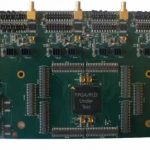To keep track of my business and personal finances I use software from Quicken, but for an SoC with hundreds of IP blocks how do you keep track of everything? The answer is found in the growing field of EDA tools for IP management, and at DACearlier this month I sat down with Neil Handof Methodics to get an update on what the industry trends… Read More
Electronic Design Automation
What’s New with Circuit Simulation for Cadence?
Every year at DAC I enjoy making the rounds to see what’s new with SPICE circuit simulators, so on June 3rd I met with Xiuya Liand Dan Zhuof Cadence in San Francisco to get an update about their Spectre tool. There’s plenty of competition in the SPICE area from Mentor Graphics (Analog FastSPICE, Eldo, ADiT), Synopsys … Read More
Real FPGAs don’t eat fake test vectors
Vector blasting hardware is as old as digital test methodology itself. In the days of relatively simple combinational and finite state machine logic, a set of vectors aimed broadside at inputs could shake loose most faults with observable outputs. With FPGAs, creating an effective set of artificial test vectors has become a lot… Read More
Single Event Upsets
Do you know what a SEE is? It stands for single event upset. We live on a radioactive planet which is also bombarded with cosmic rays, so particles are bombarding our chips. The materials used in packaging also can create particles that cause problems, even the solder. Reliability and aging has been an area that has not been at the forefront… Read More
Wally Rhines at #51DAC: EDA Grows From Solving New Problems
Wally Rhines gave the keynote at DAC in 2004. One of the things that he pointed out ten years ago was that EDA revenue for any given market segment is pretty much flat once the initial growth phase has taken place and the market has been established. Incremental EDA revenue only comes from delivering new capabilities. Historically… Read More
ESL Tool Update from #51DAC
As promised in my May 27th blog, I visited an ESL company at DAC three weeks ago that introduced two new tools:
- Thermal Profiler
- Power Intelligence
The Secret Essence of an IoT Design
Today the semiconductor industry along with electronics industry is looking up to capitalize from massive expansion foreseen in IoT (Internet of Things) domain. In simple terms we can consider IoT as connectivity between machines which can communicate with each other and work as programmed. In localized applications such … Read More
Intel Invests in the Fabless Ecosystem!
During my illustrious career one of the most useful axioms that I use just about everyday day is: “Understand what people say but also understand why they are saying it.” This certainly applies to press releases so let’s take a look at what Intel unleashed during #51DAC (in alphabetical order):
ANSYS And Intel Collaborate… Read More
ARC EM DSP supports Always-on Devices
The ARC EM family is the low-power, embedded and low footprint processor part of the larger ARC processor. To target the ultra low-power markets like wearable and IoT, Synopsys has added DSP capabilities to EM5D and EM7D. To be specific, these cores are optimized for ultra low-power control and DSP, thanks to:
- Energy-efficient
Enabling Technologies that Will Shape the next Wearables
One of the benefits of spending the last 30 years working in Silicon Valley and publishing a fabless semiconductor book is that I get invitations to speak at events I would normally be attending. Being on the other side of the podium is truly a unique experience and one worth pursuing, absolutely. This month I spoke at #51DAC about … Read More









TSMC Process Simplification for Advanced Nodes